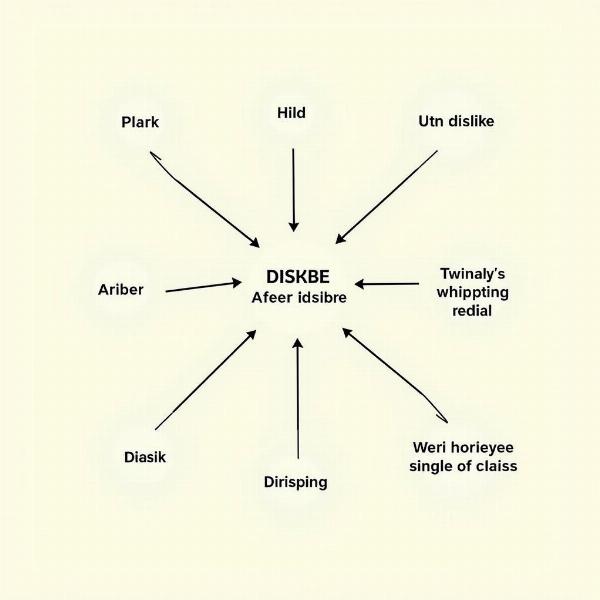Understanding the meaning of “I hate her” in Hindi requires more than a simple translation. It involves grasping the cultural nuances, the intensity of the emotion, and the context in which it’s used. While a direct translation might suffice in some situations, accurately conveying the sentiment often necessitates considering the social dynamics and relationships involved. This article explores various ways to express “I hate her” in Hindi, examining their connotations and providing context for accurate usage.
Expressing Dislike in Hindi: Beyond a Literal Translation
Directly translating “I hate her” to Hindi can result in expressions that sound harsh or unnatural. Hindi, being a richly nuanced language, offers a spectrum of words and phrases to convey dislike, ranging from mild disapproval to intense hatred. Choosing the right expression is crucial to avoid miscommunication and ensure your message is conveyed accurately.
One common mistake is directly translating “hate” using words like “nafrat” (नफ़रत). While “nafrat” signifies hatred, it carries a strong connotation and might be considered overly dramatic in everyday conversations. Instead, consider using expressions that reflect the specific nuance of dislike you intend to convey. For instance, “mujhe usse nafrat hai” (मुझे उससे नफ़रत है) is a literal translation, but it might sound extreme in casual settings.
Softer Alternatives and Their Implications
Hindi offers a range of softer alternatives to express dislike without resorting to the intensity of “hate.” These options allow for more nuanced communication, reflecting the specific nature of the dislike.
- “Mujhe woh pasand nahi hai” (मुझे वो पसंद नहीं है): This translates to “I don’t like her.” It’s a polite and common way to express dislike without being overly harsh.
- “Mujhe usse chirh hai” (मुझे उससे चिढ़ है): This means “I’m irritated by her.” It conveys a sense of annoyance or frustration without implying deep-seated hatred.
- “Woh mujhe bilkul achhi nahi lagti” (वह मुझे बिल्कुल अच्छी नहीं लगती): This translates to “I don’t like her at all.” While stronger than “mujhe woh pasand nahi hai,” it still avoids the extreme nature of “hate.”
Cultural Context and Social Dynamics
Indian culture often emphasizes politeness and indirect communication. Directly expressing strong negative emotions like hatred can be considered impolite, especially towards elders or within formal settings. Therefore, understanding the social dynamics and the relationship between the speaker and the person being discussed is crucial for choosing the appropriate expression.
For instance, expressing intense dislike towards a family member might be met with disapproval, even if the feeling is justified. In such cases, using softer expressions or discussing the issue indirectly might be more culturally appropriate.
Choosing the Right Words: A Practical Guide
The table below summarizes various ways to express “I hate her” in Hindi, ranging from mild dislike to intense hatred, along with their appropriate contexts:
| Hindi Expression | English Translation | Context |
|---|---|---|
| Mujhe woh pasand nahi hai (मुझे वो पसंद नहीं है) | I don’t like her | General dislike, polite and common |
| Mujhe usse chirh hai (मुझे उससे चिढ़ है) | I’m irritated by her | Annoyance or frustration |
| Woh mujhe bilkul achhi nahi lagti (वह मुझे बिल्कुल अच्छी नहीं लगती) | I don’t like her at all | Stronger dislike |
| Mujhe usse nafrat hai (मुझे उससे नफ़रत है) | I hate her | Intense hatred, use cautiously |
 Hindi expressions for dislike
Hindi expressions for dislike
Conclusion: Navigating the Nuances of Dislike in Hindi
Accurately conveying the meaning of “I hate her” in Hindi requires understanding the cultural context, social dynamics, and the nuances of the language. While a direct translation using “nafrat” (नफ़रत) is possible, it often carries a strong connotation and might be unsuitable for many situations. By using softer alternatives like “mujhe woh pasand nahi hai” or “mujhe usse chirh hai,” you can express dislike more appropriately and effectively. Choosing the right words not only ensures accurate communication but also demonstrates sensitivity to cultural norms and social etiquette.
FAQ:
- Is it rude to say “mujhe usse nafrat hai” in Hindi? While not inherently rude, it’s a strong expression and should be used cautiously, considering the context and relationship.
- What are some other ways to express dislike without using “nafrat”? You can use phrases like “mujhe woh pasand nahi hai” (I don’t like her) or “woh mujhe bilkul achhi nahi lagti” (I don’t like her at all).
- How can I express dislike towards someone older than me in Hindi? It’s best to use polite and indirect language, focusing on the behavior rather than the person.
- Why is it important to consider cultural context when expressing dislike in Hindi? Indian culture often emphasizes politeness and indirect communication, so direct expressions of strong negative emotions can be perceived as rude.
- What should I do if I’m unsure about the appropriate way to express dislike in Hindi? It’s always best to err on the side of caution and use a more polite or indirect expression.
Meaning-Hindi.in is your trusted partner for accurate and culturally sensitive Hindi translations. We offer a wide range of translation services, including business and commercial document translation, certified and legal document translation, technical and user manual translation, website and localization services, and much more. Need help conveying your message accurately in Hindi? Contact us at [email protected] or call us at +91 11-4502-7584. Meaning-Hindi.in is dedicated to bridging language barriers and fostering effective communication.